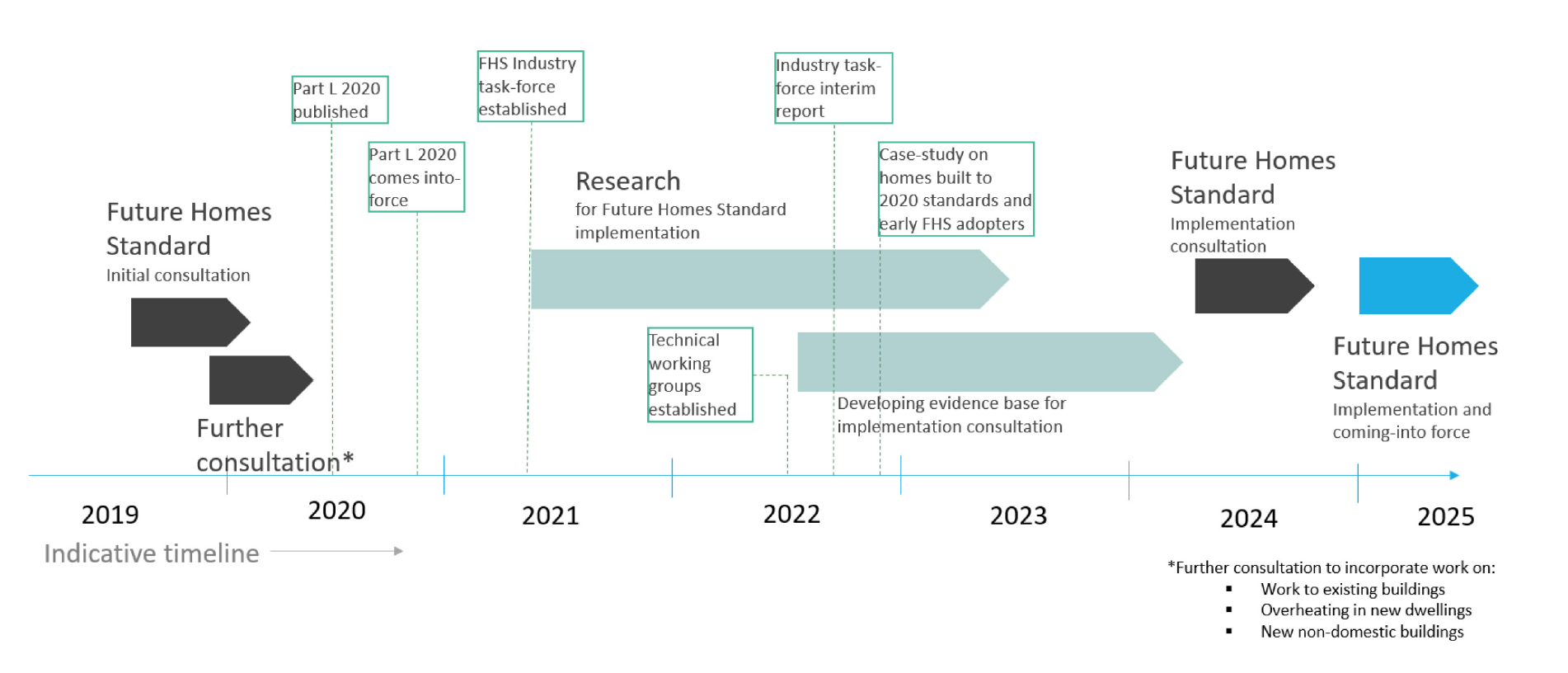BRE Group response to the Future Homes Standard consultation
In October 2019 the government launched a consultation on stronger building regulations to help pave the way for a Future Homes Standard. The consultation ran from 1 October 2019 to 7 February 2020. This article sets out the response of the BRE Group to the consultation.

|
| Roadmap to the future homes standard. |
Contents |
[edit] Introduction
In order to tackle climate challenge, we must capitalise on consumers’ desire for more sustainable, safe, quality homes and a changing market where the financial sector are playing a key role. Policy should have a clear minimum, but equally encourage innovation to go above and beyond, bringing new technologies and techniques. It should look at this holistically ensuring that homes work for our changing demographics but are also safe, resilient, secure and affordable. Getting this right will mean that the people have the best homes they can to live in and it will create a strong baseline to export skills, knowledge and products globally.
[edit] Summary
We think the current proposal falls short of delivering this as it is likely to encourage a culture of design for compliance rather than encouraging performance. A true Future Homes Standard should not only be considered in relation to Building Regulations. Our solution is that a Government supported holistic framework covering key sustainability issues is made available much sooner than the proposed timetable for regulations. This framework can be used by other Government levers such as procurement via Homes England, or as part of criteria for a renewed Help to Buy and also for planning purposes.
[edit] Market context
Importantly such a framework can also be used by private investors, lenders and others who can help the market get to Zero Carbon much sooner. The rapid evolution of Green Finance requirements means that the consumers of the future are likely to be penalised by lenders (via higher mortgage rates) for homes which are considered to be poor performing in terms of sustainability.
New homes should be a force for good, they should be something that people want, and people want in their communities. Creating market pulls for more high quality, truly sustainable new homes will also encourage greater improvements in our existing housing stock, potentially using similar mechanisms, financial drivers and frameworks.
Planning has a role to play in this as it often sows the seed of good ideas at an early stage. This is important because investors that want higher levels of energy efficiency and may not be involved in the process at this stage. An example we have been made aware of includes cases where investors have ensured developers have delivered on their Code for Sustainable Homes requirements from planning. However, this must be within a framework not to create confusion or inefficiencies within the system that discourage innovative ways of development.
[edit] Regulations or aspiration?
We welcome the published details of the Future Homes Standard as a trajectory to future iterations of Part L. However, in order to live up to its name the scope of the standard would need to be significantly evolved to issues which we understand to be outside the requirements of the Building Act 1984 as amended. Minimum standards within Building Regulations should be just that – minimum requirements – not an aspiration. By calling Building Regulations a “Future Homes Standard” it suggests that it is an aspiration. Aspiration is exactly what the sector needs, but without a holistic framework for different stakeholders to work to, opportunities are being lost.
[edit] BRE solution
BRE, working with others, would be happy to support the further development of a true Future Homes Standard that includes issues such as embodied carbon and those to support our ageing population that provides a stretch to the sector. We believe that a digitally enabled framework that provides consumers, developers, manufacturers, financiers and planners with the assurance in what is being delivered would be a valuable way of driving this agenda forward.
BRE exists to create assurance standards and independent benchmarking solutions which are delivering performance already in the housing markets. These include BREEAM and Home Quality Mark (HQM).World leading policy in the UK enables BRE to export standards, benchmarks, calculation methodologies, analysis and advice internationally, which in turn, supports UK based designers and product manufacturers.
A diverse housing supply encourages innovation, helps to raise standards more quickly and reduces cost when minimum regulation is implemented. While not up to date, we did some analysis into the falling cost of the Code (Future of Sustainable Housing; page 6) which ultimately helped ensure future regulatory changes have been cheaper for industry overall.
We would welcome the opportunity to discuss our proposals further and will contact the MHCLG team to set up a meeting.
This article was originally published on the BRE website on 11 March 2020.
[edit] Related articles on Designing Buildings Wiki
- BRE articles on Designing Buildings Wiki.
- BRE response to the green housing revolution.
- BREEAM.
- Building Better, Building Beautiful Commission interim report.
- Building Better, Building Beautiful Commission.
- Building Research Establishment.
- Code for Sustainable Homes.
- Future Homes Standard.
- Green Housing Revolution.
- Home Quality Mark.
- National Design Guide.
Featured articles and news
The challenge as PFI agreements come to an end
How construction deals with inherit assets built under long-term contracts.
Skills plan for engineering and building services
Comprehensive industry report highlights persistent skills challenges across the sector.
Choosing the right design team for a D&B Contract
An architect explains the nature and needs of working within this common procurement route.
Statement from the Interim Chief Construction Advisor
Thouria Istephan; Architect and inquiry panel member outlines ongoing work, priorities and next steps.
The 2025 draft NPPF in brief with indicative responses
Local verses National and suitable verses sustainable: Consultation open for just over one week.
Increased vigilance on VAT Domestic Reverse Charge
HMRC bearing down with increasing force on construction consultant says.
Call for greater recognition of professional standards
Chartered bodies representing more than 1.5 million individuals have written to the UK Government.
Cutting carbon, cost and risk in estate management
Lessons from Cardiff Met’s “Halve the Half” initiative.
Inspiring the next generation to fulfil an electrified future
Technical Manager at ECA on the importance of engagement between industry and education.
Repairing historic stone and slate roofs
The need for a code of practice and technical advice note.
Environmental compliance; a checklist for 2026
Legislative changes, policy shifts, phased rollouts, and compliance updates to be aware of.
UKCW London to tackle sector’s most pressing issues
AI and skills development, ecology and the environment, policy and planning and more.
Managing building safety risks
Across an existing residential portfolio; a client's perspective.
ECA support for Gate Safe’s Safe School Gates Campaign.
Core construction skills explained
Preparing for a career in construction.
Retrofitting for resilience with the Leicester Resilience Hub
Community-serving facilities, enhanced as support and essential services for climate-related disruptions.






















